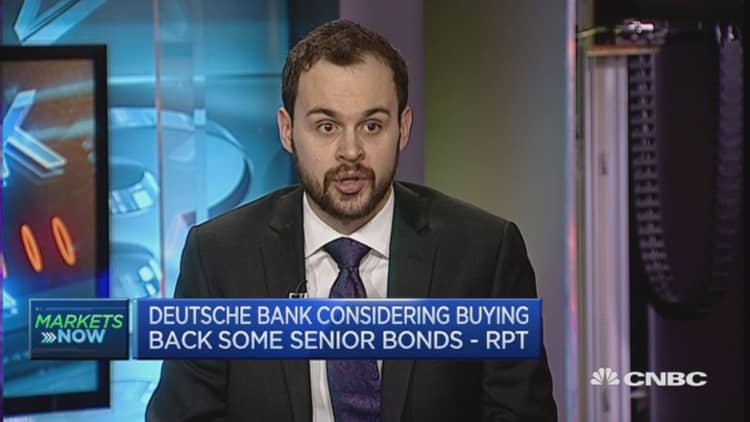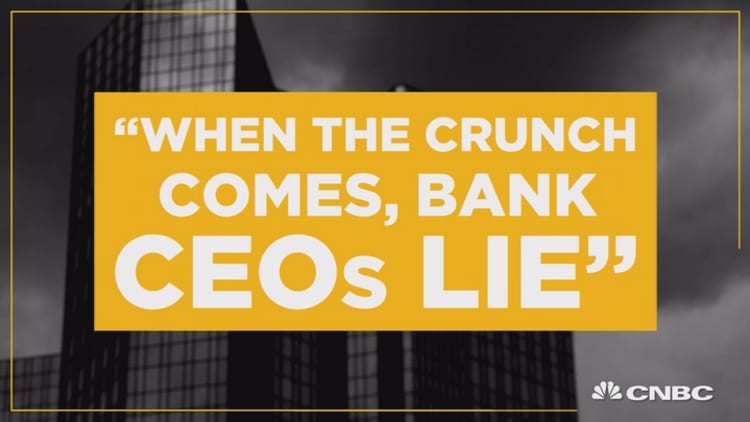
After losing a quarter of their market value since the start of the year, European banks are looking badly bruised and trying hard to reassure investors that there is nothing to fear.
Shares have sold off as falling oil prices and slowing growth in China conspired to make the start of 2016 the worst on record on Wall Street. Europe has not been spared, with banking stocks down almost 25 percent year-to-date as concerns over provisions for bad debts and the banks' exposure to the energy sector loans grows.
Deutsche Bank shares have come under severe pressure; the stock is down over 30 percent year-to-date. The group's co-CEO said in a memo to staff on Tuesday that the bank remained "absolutely rock-solid" given its strong capital and risk position. But the comments only served to undermine investors' confidence further, with the stock tumbling once again.
On Monday it had already tried to restore calm by saying it had "sufficient" reserves to service its so-called tier 1 debts, or its most junior bonds. There was some respite on Wednesday. Shares soared 15 percent following a Financial Times report which said the bank was considering buying back several billion euros of its debt.
Analysts caution against doomsday scenarios, arguing banks are in much better shape than in 2008 when the financial crisis unfolded.

"This is not the financial crisis all over again. Banks are in a much better position and a much stronger position from a balance sheet perspective than they were a few years ago," Alex Dryden, global market strategist at JPMorgan Asset Management told CNBC. "I don't think the valuations that are being touted at the moment are accurate of what we're seeing on the ground."
Credit Suisse has also witnessed heavy selling while its chief executive, Tidjane Thiam, argued in an interview with CNBC that the "world would have to come to an end" before investing in banks proved risky. The additional capital that banks had raised and new regulation meant that banks were in very different shape he argued. Meanwhile Italian banks have come under scrutiny after European Central Bank requested further information on their still-large portfolios of non-performing loans. After days of heavy selling, Italian banks rebounded sharply on Wednesday with gains of over 10 percent.
Not everyone is convinced, however. Marcus Ashworth, chief markets strategist at Haitong Securities, said last week that investors should be "petrified" of the banking sector.
"The reality is the regulators have made this a nightmare for the banks to navigate and at the same time the on-going litigation costs are just incalculable," he told CNBC.
Weak earnings have not helped some of these high-profile banks, but analysts at Nomura point out that "at the halfway point for European banks' fourth-quarter results, almost as many banks have missed consensus expectations as beaten".
"Misses were typically driven by year-end kitchen sinking rather than any material deterioration in asset quality where forward guidance remains benign on the assumption that a recession is to be avoided," research analysts at Nomura said in a note published Wednesday.
They see asset quality, liquidity and capital levels "far above previous crises, even as share prices test the lows".
Patrick Armstrong, CIO at Plurimi Investment Managers argued capitalization was not like in 2008, adding that amid the negative market sentiment we were currently witnessing, markets were punishing all the potential "weak links" in the financial system. Those included banks with weaker capitalization, but also emerging markets, China and exporters.
"I just think it's gone a bit overboard right now with respect to Deutsche Bank and European banks in general," he said. "The earnings environment isn't good but the capitalization of Deutsche Bank I think is an overreaction."
Nomura points out that Credit Suisse and Deutsche Bank were hit by concerns over capital adequacy as they booked goodwill impairments, and restructuring and litigation charges.
Both stocks now trade well below crisis levels at prices not seen since the early 1990s, it points out
"There definitely is almost a crisis state right now, he added, and the crisis isn't there," Armstrong said. "Deutsche Bank isn't about to go bankrupt. It's got a lot of issues facing it."


